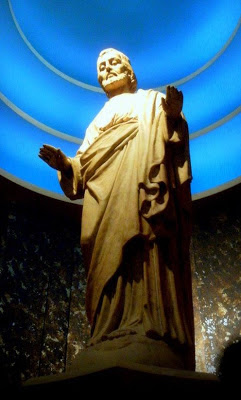St. Joseph, pray that Jesus
may come into my soul and sanctify me.
St. Joseph, pray that Jesus
may come into my heart and inspire it with charity.
St. Joseph, pray that Jesus
may come into my mind and enlighten it.
St. Joseph, pray that Jesus
may guide my will and strengthen it.
St. Joseph, pray that Jesus
may direct my thoughts and purify them.
St. Joseph, pray that Jesus
may guide my desires and direct them.
St. Joseph, pray that Jesus
may look upon my deeds and extend His blessings.
St. Joseph, pray that Jesus
may inflame me with love for Him.
St. Joseph, request for me from Jesus
the imitation of thy virtues.
St. Joseph, request for me from Jesus
true humility of spirit.
St. Joseph, request for me from Jesus
meekness of heart.
St. Joseph, request for me from Jesus
peace of soul.
St. Joseph, request for me from Jesus
a holy fear of the Lord.
St. Joseph, request for me from Jesus
a desire for perfection.
St. Joseph, request for me from Jesus
a gentleness of heart.
St. Joseph, request for me from Jesus
a pure and charitable heart.
St. Joseph, request for me from Jesus
the wisdom of faith.
St. Joseph, request for me from Jesus
His blessing of perseverance in my good deeds.
St. Joseph, request for me from Jesus
the strength to carry my crosses.
St. Joseph, request for me from Jesus
a disdain for the material goods of this world.
St. Joseph, request for me from Jesus
the grace to walk on the narrow path toward Heaven.
St. Joseph, request for me from Jesus
the grace to avoid all occasion of sin.
St. Joseph, request for me from Jesus
a holy desire for eternal bliss.
St. Joseph, request for me from Jesus
the grace of final perseverance.
St. Joseph, do not abandon me.
St. Joseph, pray that my heart
may never cease to love thee.
St. Joseph, for the love thou bearest for Jesus,
grant that I may learn to love Him.
St. Joseph, graciously accept me as thy devoted servant.
St. Joseph, I give myself to thee; accept my pleas
and hear my prayers.
St. Joseph, do not abandon me at the hour of my death.
Jesus, Mary and Joseph,
I give Thee my heart and my soul.
Memorare
Remember, o most pure Spouse of the Virgin Mary, my sweet Protector Saint Joseph, never was it heard that anyone who implored thy help nor sought thy intercession was left unaided. Inspired by this confidence I come to thee and to thee do I fervently commend myself. Despise not my petitions, I beseech thee, foster Father of the Redeemer, but graciously hear them. + Amen.
www.PrinceOfTheChurch.yolasite.com












